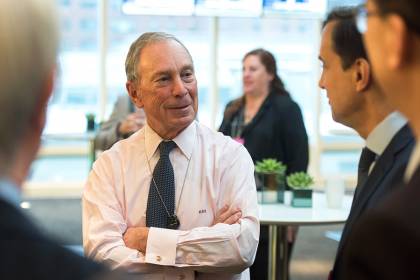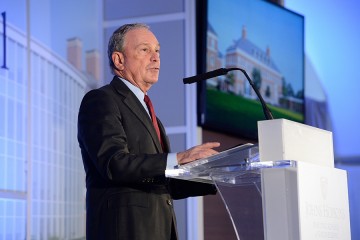Consider the needle moved.
Last fall, philanthropist, business leader, and three-term New York City Mayor Michael R. Bloomberg committed a record-breaking $1.8 billion to support undergraduate financial aid at Johns Hopkins, the largest-ever single contribution to a college or university.
From this point forward, a Hopkins education will be within reach for qualified students, no matter what their family's financial circumstances. The donation will guarantee that Johns Hopkins can commit permanently and publicly to need-blind admissions, eliminate student loans from the university's financial aid packages, and overall drastically ease the financial burden on students and their families by reducing their contribution cost.
Bloomberg, a 1964 Johns Hopkins graduate, announced his historic gift in a New York Times op-ed in which he identified access to college for low- and middle-income students as a significant national challenge. A 2017 Times report noted that more students at elite schools come from families in the top 1 percent of the income scale than from the bottom 60 percent. Tens of thousands of deserving students don't even apply to such institutions, thinking the cost out of reach.
"America is at its best when we reward people based on the quality of their work, not the size of their pocketbook," Bloomberg wrote in his op-ed. "Denying students entry to a college based on their ability to pay undermines equal opportunity. It perpetuates intergenerational poverty. And it strikes at the heart of the American dream: the idea that every person, from every community, has the chance to rise based on merit."
Not only do certain students lose out, Bloomberg said, but so do colleges that would benefit from their talents and diverse perspectives.

Image caption: Businessman and philanthropist Michael R. Bloomberg has given more than $3.35 billion to Johns Hopkins University since 1964, the most by any individual to a U.S. college or university.
The gift realizes a pledge made by JHU President Ronald J. Daniels at his installation in 2009, when he committed the university to becoming permanently need-blind, a key priority of his presidency also reflected in the Ten by Twenty, which articulates the university's priorities through the end of the decade. (Need-blind refers to a college admissions policy in which applicants are judged solely on their merits, irrespective of their ability to pay for tuition.)
"This historic gift reflects Mike Bloomberg's deep belief in the transformative power of higher education, and his insistence that it be accessible to all qualified students, regardless of financial means," Daniels wrote in a message to the university community. "It also affirms Mike's profound devotion to this university for the role that it played in enriching his life."
Bloomberg's first donation to his alma mater was $5 in 1965, a year after he graduated with a bachelor's degree in engineering. With his latest and largest gift, Bloomberg's combined philanthropy to Johns Hopkins exceeds $3.35 billion. And it's not his first to address the issue of college access. The Bloomberg Scholarship program, launched in 2013 as part of a $350 million pledge, provides renewable tuition grants for qualifying students to cover their student loan debt.
For Damali Davis, the Bloomberg Scholarship she received lessened the financial burden of college for her family, and allowed her to pursue a degree in the nation's top-ranked biomedical engineering program.
"The scholarship definitely made my decision to come to Hopkins a lot easier," says Davis, one of the more than 500 undergraduates who have attended Johns Hopkins as Bloomberg Scholars over the past five years.
Bloomberg's unprecedented gift will create similar opportunities for generations of Hopkins students.
"It's really exciting," Davis says. "I know a lot of people right now are struggling with debt. So, to see that this could impact the rest of their time at Hopkins and help them financially is really just amazing."
The new policy will apply immediately to current students for the spring 2019 semester. Beginning in the fall of 2019, the university will remove undergraduate student loans from all financial aid packages and replace them with grant aid.
In an instant, Johns Hopkins now ranks among the top universities in per-student financial aid support, with a program designed to maximize student access and mobility, according to Dave Phillips, vice provost for admissions and financial aid.
"This allows us to admit the right students for Johns Hopkins, no matter their economic backgrounds," Phillips says.
With more than $1.5 trillion in outstanding student loans in the country, college loans are the second-largest consumer debt segment in the country after mortgages, according to the Federal Reserve's most recent annual report. Reducing or eliminating student debt can change the experience students have at Johns Hopkins, Phillips said.
"They will now be unencumbered by these considerations and can pursue their interests and passions, wherever that takes them," he says. "We worry that some students might choose an academic or post-career path influenced by debt considerations."
As for the gift's impact to date, Phillips says it's still too early to glean any influence on the makeup of the incoming class. But coupled with expanded recruitment and post-enrollment support programs, these new financial aid offerings will ensure that Hopkins is able to recruit and enroll more first-generation and low-income students. JHU has made a commitment to have at least 20 percent of its undergraduate student body eligible for federal Pell grants by 2023.
Kevin G. Shollenberger, the university's vice provost for student affairs, says the gift allows Johns Hopkins to enhance its "wrap-around services" to help students take full advantage of and better navigate the JHU experience. Of note, the funds will allow the university to expand existing support services, such as year-round holistic advising, leadership development, and academic support.
"We can do even more high-contact advising and mentorship, and offer additional programming and support services for this population," Shollenberger says. He gave the example of adding voluntary online tutorial courses for those enrolled in large foundational courses, such as calculus and biology, where students sometimes struggle.
Drawing from a deeper, and more diverse, pool of students will only enhance the overall experience for the entire JHU student population, Shollenberger says.
"Students will learn from and with those who come from different backgrounds, who might bring different perspectives," he says. "That benefits everyone."
Posted in University News
Tagged philanthropy, michael bloomberg









